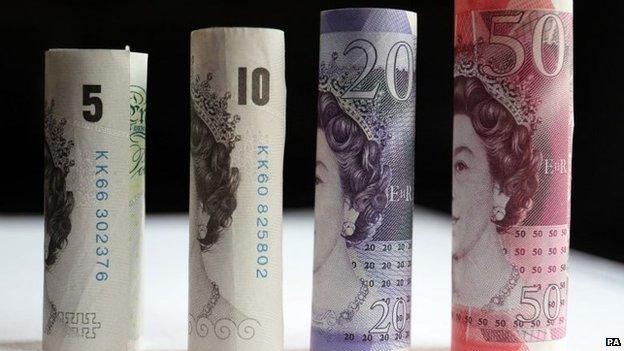Why is the Treasury's interest rate so low?
- Published
- comments

How should the government take advantage of the record low interest rates it pays?
There are two big immediate causes of the rising price of UK government bonds or debt - whose effect is that it is cheaper than it has ever been for the Treasury to borrow for maturities of 10 years and 30 years.
First, inflation in the UK, driven mainly but not totally by falling oil prices, is heading towards zero in April and may turn negative or into deflation thereafter.
Inflation being so far below the 2% official target means the Bank of England has been signalling a delay in the fateful day when it will raise the interest rate it controls - probably till well into next year
Second, and just as important has been the announcement by the European Central Bank that it plans to buy more than a trillion euros of eurozone governments' and private sector bonds, in a big programme of quantitative easing.
This has driven up the price of German bonds to record prices, which in turn makes UK government debt seem better value to investors.
QE also weakens the value of the euro, which in turn means that the price of imports into Britain from the eurozone will fall - further reinforcing the downward pressure on UK inflation.
Not persuaded
And in case you think none of this matters to you, well for one thing, if you have a pension fund, you will have massive holdings of these surging bonds - and for another, the cost to taxpayers of the £90bn per year the government still has to borrow is being significantly cut.
Which is why there are plenty of economists who argue that the government should take advantage of these record low rates to borrow even more, to finance big infrastructure and investment projects - although the Chancellor is utterly un-persuaded.
And as I've said before, a further underlying cause of the record high price of the official debt of mature western economies is widespread pessimism that economic growth will be subdued for years and maybe decades - since that encourages investors to make low-risk investment in supposedly high quality sovereign debt.
Just possibly, some economists would say - and not just those regarded as lefty - if a British or German government borrowed more to build new high speed train lines, roads and schools then the underlying growth rate of the European economy would pick up.
But George Osborne would say that with UK government debt so elevated and still rising, it is more sensible to reduce the deficit as fast as possible - just in case interest rates don't remain at these record low levels.